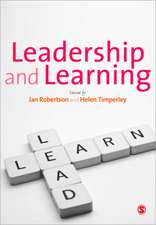Democratic Leadership in Education: Leading Teachers, Leading Schools Series
Autor Philip Arthur Woodsen Limba Engleză Paperback – 7 sep 2005
`I found this an interesting and stimulating book. The book's ideas are a useful counterpoint to some of the daft notions of macho leadership and management being peddled in education and indeed the public sector more widely. Woods' book has the merits that, though radical, it seeks to base its recommendations in the real world and to argue that there are possibilities for change that can bring about real improvements in everyone's experience and outcomes. Matching the rhetoric of democracy with reality – or at least making them closer – might also improve the quality of our political process, and hence increase interest and reduce cynicism about politics, something which surely should be welcomed. Woods' agenda is significant and his book certainly worth reading' - ESCalate
`Philip Woods productively refocuses our attention, not on heroes and visions but on how we understand and practise within educational institutions in ways that are social and relational. He provides a realistic and yet challenging analysis of democratic leadership in ways that speak to practitioners, policy makers and researchers. We deal everyday with issues of social justice, and Philip Woods shows us how we might think differently about it, and so work for a better system of learning and schooling' - Professor Helen Gunter, School of Education, University of Manchester
'Not another bunny, but a welcome academic fox' - Kevin Avison, Steiner Waldorf Schools' Fellowship
'The theory and practice of democracy and democratic leadership have implications for how we understand what ought to be counted as `improving schools'
In this book the author focuses on the idea of democratic leadership. He examines what is meant by democratic leadership, and what forms it can take, and shows how it is relevant to school education and learning. The author shows how the ideals and theories of democratic leadership can translate into practice, and sets out some of the challenges that democratic leadership poses in the context of contemporary education .
This book challenges many of the assumptions inherent in educational policy and conventional approaches to leadership. It is about understanding and exploring both the idea of democratic leadership and its practical relevance through examples drawn from practice and research.
This book is for practitioners and students on professional development and academic courses. It will be essential reading for all policy-makers, academics and others (such as inspectors) who critically examine leadership and management of educational institutions.
'Every now and then a book is written in the field of leadership that stands out, says something different, is coherent, original and makes us really ponder and think. This is such a book - it will provoke policy-makers, academics, experienced practitioners and advanced students' - Camridge Journal & Education
| Toate formatele și edițiile | Preț | Express |
|---|---|---|
| Paperback (1) | 462.87 lei 6-8 săpt. | |
| SAGE Publications – 7 sep 2005 | 462.87 lei 6-8 săpt. | |
| Hardback (1) | 1285.03 lei 6-8 săpt. | |
| SAGE Publications – 30 aug 2005 | 1285.03 lei 6-8 săpt. |
Preț: 462.87 lei
Nou
Puncte Express: 694
Preț estimativ în valută:
88.58€ • 92.14$ • 73.13£
88.58€ • 92.14$ • 73.13£
Carte tipărită la comandă
Livrare economică 15-29 aprilie
Preluare comenzi: 021 569.72.76
Specificații
ISBN-13: 9781412902915
ISBN-10: 1412902916
Pagini: 192
Ilustrații: Illustrations
Dimensiuni: 156 x 234 x 11 mm
Greutate: 0.3 kg
Ediția:First Edition
Editura: SAGE Publications
Colecția Sage Publications Ltd
Seria Leading Teachers, Leading Schools Series
Locul publicării:London, United Kingdom
ISBN-10: 1412902916
Pagini: 192
Ilustrații: Illustrations
Dimensiuni: 156 x 234 x 11 mm
Greutate: 0.3 kg
Ediția:First Edition
Editura: SAGE Publications
Colecția Sage Publications Ltd
Seria Leading Teachers, Leading Schools Series
Locul publicării:London, United Kingdom
Recenzii
`I found this an interesting and stimulating book. The book’s ideas are a useful counterpoint to some of the daft notions of macho leadership and management being peddled in education and indeed the public sector more widely. Woods’ book has the merits that, though radical, it seeks to base its recommendations in the real world and to argue that there are possibilities for change that can bring about real improvements in everyone’s experience and outcomes. Matching the rhetoric of democracy with reality – or at least making them closer – might also improve the quality of our political process, and hence increase interest and reduce cynicism about politics, something which surely should be welcomed. Woods’ agenda is significant and his book certainly worth reading' - ESCalate
`Philip Woods productively refocuses our attention, not on heroes and visions but on how we understand and practise within educational institutions in ways that are social and relational. He provides a realistic and yet challenging analysis of democratic leadership in ways that speak to practitioners, policy makers and researchers. We deal everyday with issues of social justice, and Phil Woods shows us how we might think differently about it, and so work for a better system of learning and schooling' - Professor Helen Gunter, School of Education, University of Manchester.
'Every now and then a book is written in the field of leadership that stands out, says something different, is coherent, original and makes us really ponder and think. This is such a book - it will provoke policy-makers, academics, experienced practitioners and advanced students' - Camridge Journal & Education
`Philip Woods productively refocuses our attention, not on heroes and visions but on how we understand and practise within educational institutions in ways that are social and relational. He provides a realistic and yet challenging analysis of democratic leadership in ways that speak to practitioners, policy makers and researchers. We deal everyday with issues of social justice, and Phil Woods shows us how we might think differently about it, and so work for a better system of learning and schooling' - Professor Helen Gunter, School of Education, University of Manchester.
'Every now and then a book is written in the field of leadership that stands out, says something different, is coherent, original and makes us really ponder and think. This is such a book - it will provoke policy-makers, academics, experienced practitioners and advanced students' - Camridge Journal & Education
Cuprins
Meanings of Democratic Leadership
A Developmental Conception of Democratic Practice
Models of Leadership
Why Democratic Leadership?
An Open Approach to Knowledge
Links to Learning
Obstacles and Challenges
Free Space and Firm Framing
Capabilities and Skills for Democratic Leadership
Complexities and Demands of Practice
Dualities of Democratic Leadership
A Developmental Conception of Democratic Practice
Models of Leadership
Why Democratic Leadership?
An Open Approach to Knowledge
Links to Learning
Obstacles and Challenges
Free Space and Firm Framing
Capabilities and Skills for Democratic Leadership
Complexities and Demands of Practice
Dualities of Democratic Leadership














